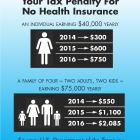I-Team In-Depth
Should You Take The Health Care Tax Hit?
|
Time is running out for thousands of uninsured Connecticut residents who must decide whether to comply with a federal mandate to buy health insurance starting Jan. 1, 2014 or pay a penalty instead. “We are undertaking a paradigm shift in how we think about health insurance,” said Dan M. Smolnik, a tax attorney from Brookfield. “We don’t know for sure how people in Connecticut will respond. But I think the majority will weigh the risks of not having health insurance and make a rational decision that isn’t purely based on economics.
